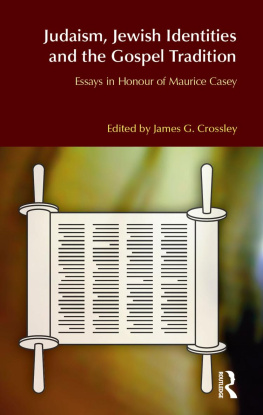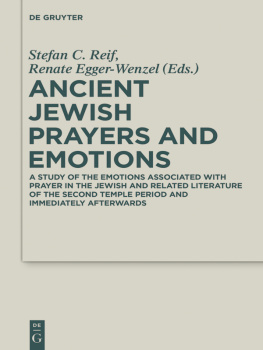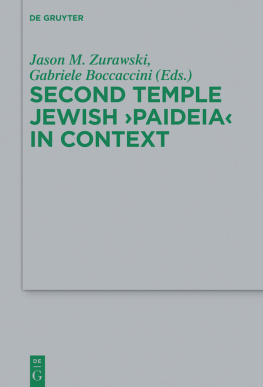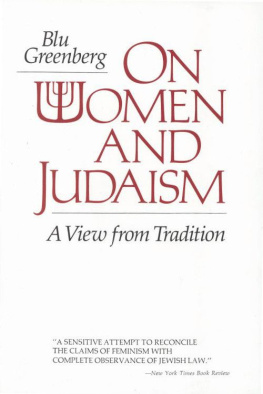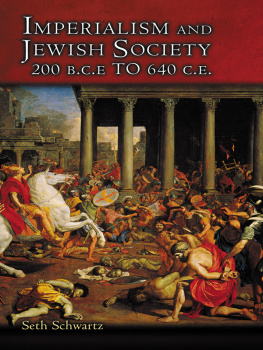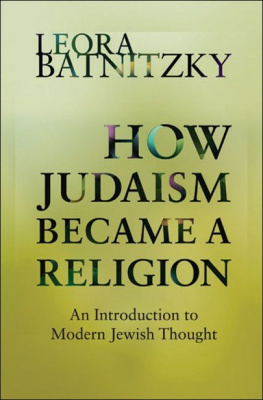THE SAMUEL & ALTHEA STROUM LECTURES IN JEWISH STUDIES
The Yiddish Art Song performed by Leon Lishner, basso, and Lazar Weiner, piano (stereophonic record album)
The Holocaust in Historical Perspective
Yehuda Bauer
Zakhor: Jewish History and Jewish Memory
Yosef Hayim Yerushalmi
Jewish Mysticism and Jewish Ethics
Joseph Dan
The Invention of Hebrew Prose:
Modern Fiction and the Language of Realism
Robert Alter
Recent Archaeological Discoveries and Biblical Research
William G. Dever
Jewish Identity in the Modern World
Michael A. Meyer
I. L. Peretz and the Making of Modern Jewish Culture
Ruth R. Wisse
The Kiss of God: Spiritual and Mystical Death in Judaism
Michael Fishbane
Gender and Assimilation in Modern Jewish History: The Roles and Representation of Women
Paula E. Hyman
Portrait of American Jews: The Last Half of the 20th Century
Samuel C. Heilman
Judaism and Hellenism in Antiquity: Conflict or Confluence?
Lee I. Levine
Copyright 1998 by the University of Washington Press
Printed in the United States of America
All rights reserved. No portion of this publication may be reproduced or transmitted in any form or by any means, electronic or mechanical, including photocopy, recording, or any information storage or retrieval system, without permission in writing from the publisher.
Library of Congress Cataloging-in-Publication Data
Levine, Lee I.
Judaism and Hellenism in antiquity: conflict or confluence? / Lee I. Levine p. cm. (The Samuel & Althea Stroum lectures in Jewish studies) Includes bibliographical references and index.
ISBN 0-295-97682-9 (alk. paper)
ISBN-13 978-0-295-80382-1 (ebook)
1. JudaismRelationsGreek. 2. JewsCivilizationGreek influences. 3. JudaismHistoryPost-exilic period, 586B.C-210 A.D. 4. GreeceReligion. 5. SynagoguesHistory. 6. Hellenism I. Title. II. Series: Samuel and Althea Stroum lectures in Jewish studies.
BM536.G7L49 1998
296.09014dc21 97-46205
CIP
The paper used in this publication is acid-free and recycled from 10 percent post-consumer and at least 50 percent pre-consumer waste. It meets the minimum requirements of American National Standard for Information SciencesPermanence of Paper for Printed Library Materials, ANSI Z39.48-1984.

THE SAMUEL & ALTHEA STROUM LECTURES IN JEWISH STUDIES
SAMUEL STROUM, BUSINESSMAN, COMMUNITY LEADER, AND philanthropist, by a major gift to the Jewish Federation of Greater Seattle, established the Samuel and Althea Stroum Philanthropic Fund.
In recognition of Mr. and Mrs. Stroum's deep interest in Jewish history and culture, the Board of Directors of the Jewish Federation of Greater Seattle, in cooperation with the Jewish Studies Program of the Henry M. Jackson School of International Studies at the University of Washington, established an annual lectureship at the University of Washington known as the Samuel and Althea Stroum Lectureship in Jewish Studies. This lectureship makes it possible to bring to the area outstanding scholars and interpreters of Jewish thought, thus promoting a deeper understanding of Jewish history, religion, and culture. Such understanding can lead to an enhanced appreciation of the Jewish contributions to the historical and cultural traditions that have shaped the American nation.
The terms of the gift also provide for the publication from time to time of the lectures or other appropriate materials resulting from or related to the lectures.
Preface
JUDAISM'S ENCOUNTER WITH HELLENISM IN THE ANCIENT world has fascinated scholars for generations. These two ostensibly different cultures clashed on occasion, yet in most instances contacts of Jews and Judaism with the Hellenistic-Roman world proved immensely fructifying and creative. Some Jews may have been intimidated by this culture, but many found it attractive, stimulating, and even indispensable. Jewish exposure to Greek wisdom is dramatically reflected in an account told by Aristotle about a Jew he met in Asia Minor (as reported by Clearchus of Soli):
Now this man, who was entertained by a large circle of friends and was on his way from the interior to the coast, not only spoke Greek, but had the soul of a Greek. During my stay in Asia, he visited the same places as I did, and came to converse with me and some other scholars, to test our learning. But as one who had been intimate with many cultivated persons, it was rather he who imparted to us something of his own. (Josephus, Against Apion 1.180-81)
The story assumes that some Jews, at least, were well acquainted with Greek philosophical terms and issues, and Aristotle's admiration was indeed remarkable.
The Jewish encounter with Greco-Roman culture was both extensive and intensive. All Jewish communities, in Palestine and throughout the Diaspora, were affected, as was every area of Jewish life. The intensive contact following Alexander's conquest gained, even more momentum under the Hasmoneans and Herod. Even with the destruction of Jerusalem and the Temple, and defeat at the hands of the Roman armies on three occasions within a period of 65 years (between 70 and 135 C.E.), this process continued right up to the end of late antiquity. Because the phenomenon was so ubiquitous, the evidence in this regard is extensive. A myriad of sourcesliterary, epigraphical, and archeologicalattests to this influence in one form or another, and to a greater or lesser degree.
The subject of the impact of Hellenism on Jewish society has always been close to my academic interests. Influenced by the oral and written teachings of my mentors, Saul Lieberman, Salo Baron, Elias Bickerman, Morton Smith, and, most significantly, Gerson Cohen, I have pursued the subject throughout my academic career, teaching about this issue and often referring to it in my writings.
The Samuel and Althea Stroum lecture series offered an opportunity to address the phenomenon of the influence and impact of Greco-Roman culture on the Jews of antiquity in a more concerted manner. For this I am most appreciative.
Given the magnitude and complexity of this phenomenon, it is impossible to do justice to the topic in any single volume. Yet, the issue is too important not to try and offer an overview, even within the purview of this modest volume. In order to avoid casting the net too widely, I have chosen to focus on three topics, which are diverse in nature yet span the entire Greco-Roman and Byzantine eras: the city of Jerusalem at the end of the Second Temple period, rabbinic culture, and the ancient synagogue. These topics involve the use of a wide range of sources that have come down to us from antiquity, such as Josephus, the New Testament, and Philo, as well as archeology (including artistic and epigraphical remains) and rabbinic literature.
I wish to thank a number of colleagues who were kind enough to read all or parts of this manuscript; their comments were most enlightening and helpful: Professors Joseph Geiger, David Golinkin, Eric Gruen, Uriel Rappaport, and Daniel Schwartz. Needless to say, I bear full responsibility for the substance and form of what follows.
My thanks to Naomi Pascal, Julidta Tarver, and Patricia Draher of the University of Washington Press for their help in facilitating this publication, to the Jewish Studies Program of the University of Washington for funding the preparation of the manuscript for publication, and to



